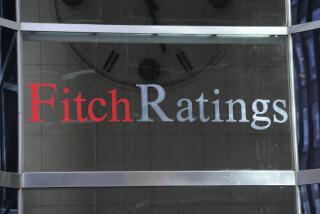GE loses top credit rating
- Share via
WASHINGTON — General Electric Co. lost its top credit rating from Standard & Poor’s on Thursday over concerns about rising loan losses and lower earnings at its lending arm, GE Capital.
The long-expected ratings cut -- down one notch to AA-plus from AAA -- offered further proof that the financial crisis had shaken the foundation of one of the nation’s biggest and traditionally most stable companies. In the last year, GE has posted disappointing earnings, seen loan losses grow and cut its dividend for the first time since the Depression.
The loss of its pristine credit rating means the company, which makes loans, industrial equipment and appliances and runs NBC, will probably pay more to borrow money.
Still, investors were relieved the rating cut wasn’t worse. GE shares rose $1.08, or 12.7%, to close at $9.57. That put them among the biggest gainers of the Dow 30.
Investors were also heartened by S&P;’s decision to raise GE’s outlook to “stable” from “negative,” making a further credit reduction unlikely in the next six to 12 months. Analysts said a rating downgrade was already factored into GE’s share price, which before Thursday had lost about half its value since the start of the year.
“This is good news as the market was expecting the downgrade, and it removes a layer of uncertainty,” said Deutsche Bank analyst Nigel Coe. He added that some GE watchers feared a rating as low as AA-minus.
On Thursday, S&P; said GE Capital faced higher losses on its loans in areas such as real estate. If it stood on its own, the ratings agency would give GE Capital a much lower A rating.
GE Capital “is under increasing earnings pressure,” wrote S&P; analyst Robert Schulz.
GE was one of just six nonfinancial companies to hold the AAA rating, which S&P; first gave the conglomerate in 1956.
Though GE previously said defending its credit rating was a priority, CEO Jeffrey Immelt indicated recently that he was prepared to fund the company at a lower level.
Fairfield, Conn.-based GE also has huge industrial businesses that make jet engines, locomotives and wind turbines. S&P; expects some deterioration of earnings and cash flow from that side of the company over the next two years as the global economy falters. However, the agency believes those operations will end 2009 with $5 billion in cash, helped by the recent dividend cut.
But most of the parent company’s problems stem from GE Capital, whose operations include credit cards, overseas mortgages and financing for commercial projects such as power plants.
GE Capital once accounted for about half of GE’s earnings, but GE now plans to shrink it to about 30% of the company’s overall profit. GE says it expects GE Capital to turn a profit this year but has set aside $10 billion for losses and is fending off speculation that greater problems are looming.
More to Read
Inside the business of entertainment
The Wide Shot brings you news, analysis and insights on everything from streaming wars to production — and what it all means for the future.
You may occasionally receive promotional content from the Los Angeles Times.










